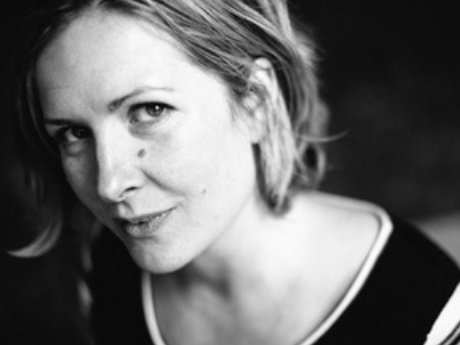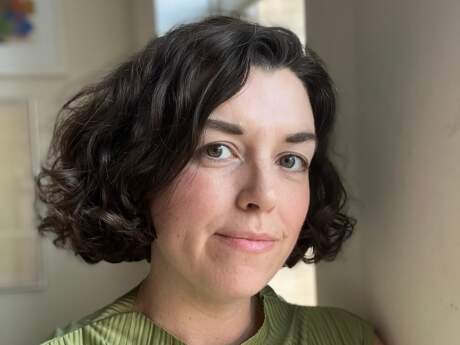In Their Own Words
Tess Taylor on “Field Report: April”

Field Report: April
Quid faciat laetes segetes, quo sidere terram vetere . . .
"What must be done to bring a heavy harvest,
under which stars to turn the earth . . ."
—Virgil, Georgics I
i
Mulching garlic: muck is heavy.
Everything is brown or gray.
Moving grasses, haying sprouts:
Cold knobs rise, ache in my fingers.
ii
In this field not Pyrrah's bones or Deucalion's
but human remains:
no war
(though even here farmers dig up old weapons)—
no helmets,
though while we work, the radio
broadcasts poppy harvests and bombings,
limbs shattering in another country—
In our field today:
a lost child's sunglasses.
iii
Hot. Cold. Then a too-warm spell:
navies of clouds come and go, come and go—
windstorms, birds
—all north too soon.
In the greenhouse
we plant nightshades,
tomatoes & cucumbers:
stage summer plenty while
the radio announces
dead seals in Labrador—
above us rose-throated grosbeak return
from Tulum, from Oaxaca, those borderless migrants.
iv
Across the hemisphere, farmers start the old art.
Bow into broccoli.
Push machines or their bodies.
Plant starts or seed.
Buy oil for tractors. Cross borders. Spray pesticides.
Virgil wrote by which signs shall we know?
We too are small against great constellations.
We plant when the sun shines. We augur & pray.
From Work & Days (Red Hen Press, 2016). All rights reserved. Reprinted with the permission of the author.
On "Field Report: April"
Today before sitting down to write about the poems in Work & Days I was out in the garden, by which I mean basically the whole space around our house. We have tomatoes and kale and fennel and favas in garden boxes out front, artichokes on the sidewalk median strip, lemons, potatoes, rhubarb and figs in the back. It is California, says my husband. The landscape should be edible.
I often work in the yard before writing: it settles my mind, focuses me. I'm pulled outside myself—becoming a watcher, a listener, someone attending. I like tallying the day's discoveries: volunteer potato sprouts from last year's bins; unruly asparagus now flowering; rhubarb I was certain we'd killed making a comeback. We're home from a long trip: everything's overgrown. I spent an hour assessing. It's the May of an El Nino year: Our lemon tree, as if shocked by water, has overproduced. Its boughs are splitting. I had to prune, pull off two dozen green lemons. My arms got scratched. I smelled the flat pleasant smell of lemon blossom. I suddenly felt present in time, year, and place.
The poems in Work & Days are about attending and attention, about the expansiveness that can emerge when we work outside and relate to plants and food. They are latter day Georgics, poems that trace one year I spent farming three acres in the Massachusetts Berkshires. The poems are also about trying to tend and attend to food, place, soil, and the body in the era of climate change; in an era when attention, particularly, seems in short supply.
The poems trace one year. But they also grow out of a life where I've gardened as long as I can remember—from the time when my parents had a plot down the hill from grad student housing in Madison, WI, to the years I ran a youth gardening program in Berkeley and taught teenagers how to grow carrots, sunflowers, and kiwis. I work with plants and food to ground myself, to dislodge my own anxiety. I try to build, in the face of great crisis, one part of the good ecosystem.
I have as much cynicism and despair and fear as the next person, but here is what the gardener in me can come to proclaim: the good ecosystem can be built. We can build it. Just this weekend I was talking to a farmer friend at the market about the awe we feel realizing how much good food a small farm can make. It is amazing to realize that three well tended acres—like the dense ecosystem I farmed in the Berkshires—can provide vegetables for 80 families all summer, stock five markets a week. In the face of bee colony collapse it is amazing to realize that the average Brooklyn block hosts two species of bee, while the block with our community garden hosts seventeen. Gardens and farms, even when small, are real. Even in seeming smallness, they re-weave the steady fabric of the world.
I want to be clear: I don't imagine this as the whole solution. I am particularly distrustful of any yuppie notion that the world is saved through the purchase of expensive cheese. But I garden because it is a starting point—a place that disrupts my cynicisms, reroutes my imagination. "To make a prairie it takes a clover and one bee—/ one clover and a bee/ and revery" wrote Emily Dickinson. The reverie, that potent daydream, is key here: The garden is not only where I relate to the world but where I can attune that relation, not only a place where I affect change but where I imagine affection. It is where, in the face of great unease, I can be present among the some of the surprisingly living things of the earth. Today, holding the green lemons, I felt part of the pleasure of this day, this rainy year, the unsteady weather, the uncertain arc of California. In tending, I could attend. All hail, Emily and the bees. All hail, reverie.
Of course, another ecosystem where we learn-to-see, and practice being-in-relation, is the poem itself. Gardens and poems share hybridities. They are partly real, partly imaginary. Poems, like gardens, ask us to enter, daydream and reroute ourselves. I think of the three-acre field, the bees netting the Brooklyn half-block with their buzz. Sometimes we talk about poems as if their bounded space—of densely cultivated sound, of observation—were somehow far from, even opposed to—some real or other political sphere beyond them. But what if the poem itself were the site at which we cultivated our political imaginations? What if the poem were the dense, fertile node in which we trained ourselves to hear, look, take pleasure in, grieve, know our lives? What if the poem, like the garden, were the living imaginary through which it became possible to make sense of the so-called real world?
2700 years ago the poet we've come to know as Hesiod is thought to have compiled a book called Works and Days. While Homer wrote epic poetry—the poetry of nation-making, transit, conquest, war, Hesiod's book was the poem as instruction manual—how to raise sheep, tend bees, raise cattle. Hesiod wrote the poetry of staying put. What should we do with our time on earth? How do we cultivate the plenty that keeps our world stable? Or, as Virgil (in the same tradition) later wrote: under which stars should we turn the soil? How do we bring forth the heavy harvest? It strikes me that 2700 years later, these questions are as fertile—as urgent—as ever.
The poem-as-instruction-manual is meant to help us learn to raise bees, but also to hear, to see, to take pleasure in, to feel. The poems in Work and Days explore a lot of things—among them being in the body, in time. They explore the boundedness of one year on one field with a troubled and apocalyptic world at its margins. They come down on the side of things that call us towards tending and attending. They come down on the side of things that call us to recognize the texture and hunger of our lives.
When this essay is done I'm going to take the green lemons—this rainy spring's odd bounty— and make lemon pickle and jar it up for when we next make dal or chicken curry. It's a simple thing really—green lemons, salt, turmeric, peppers—but also the whole season, also the whole tree. Maybe while chopping and salting I'll be thinking about the next thing I want to write, humming a little as I pack the year's fruit in a jar. The word poem comes from "poein," to heap up—as we heap up our harvests, as we heap up rocks when we move them out of a field. The word verse comes from "versus," a word that traces the turn of a plough. In this word the earth is opening up again for seeds, and the body is crafting the line, and the line is going forward towards the break. What we need to do is tend the earth, ourselves, each other. Turn and return. Turn and return. And while we do that, we can think, perhaps, of filling our working breath with our own small bit of song.


